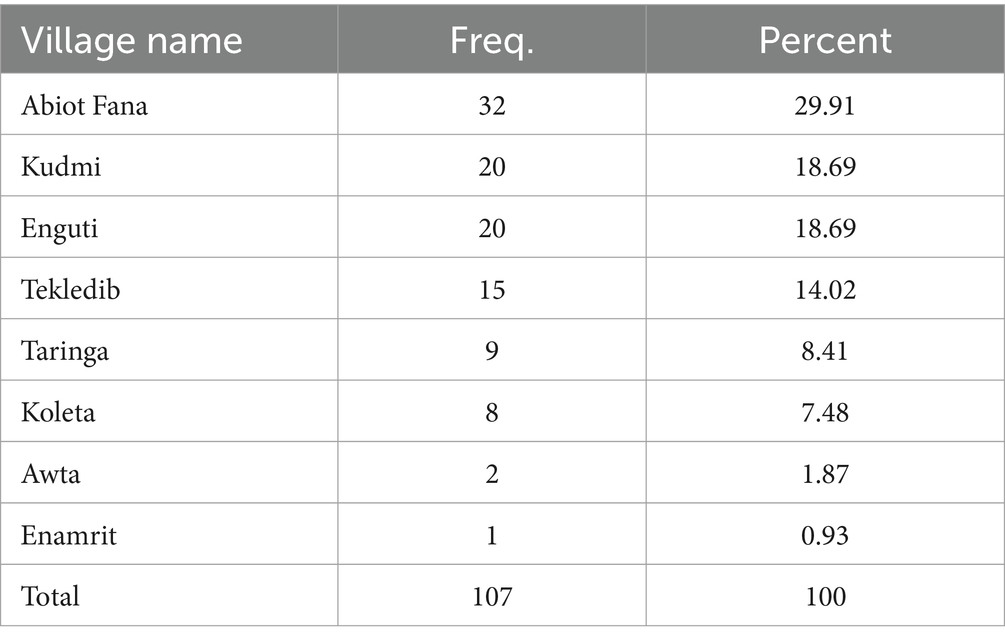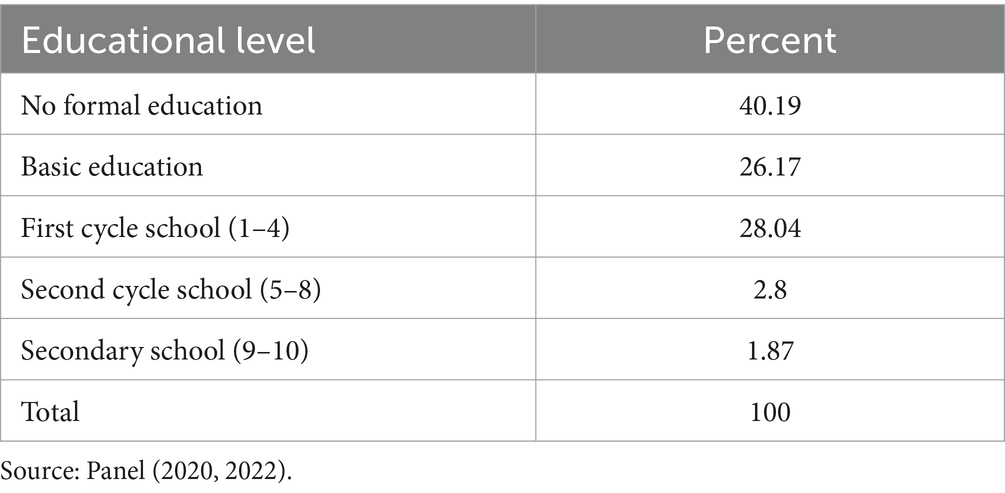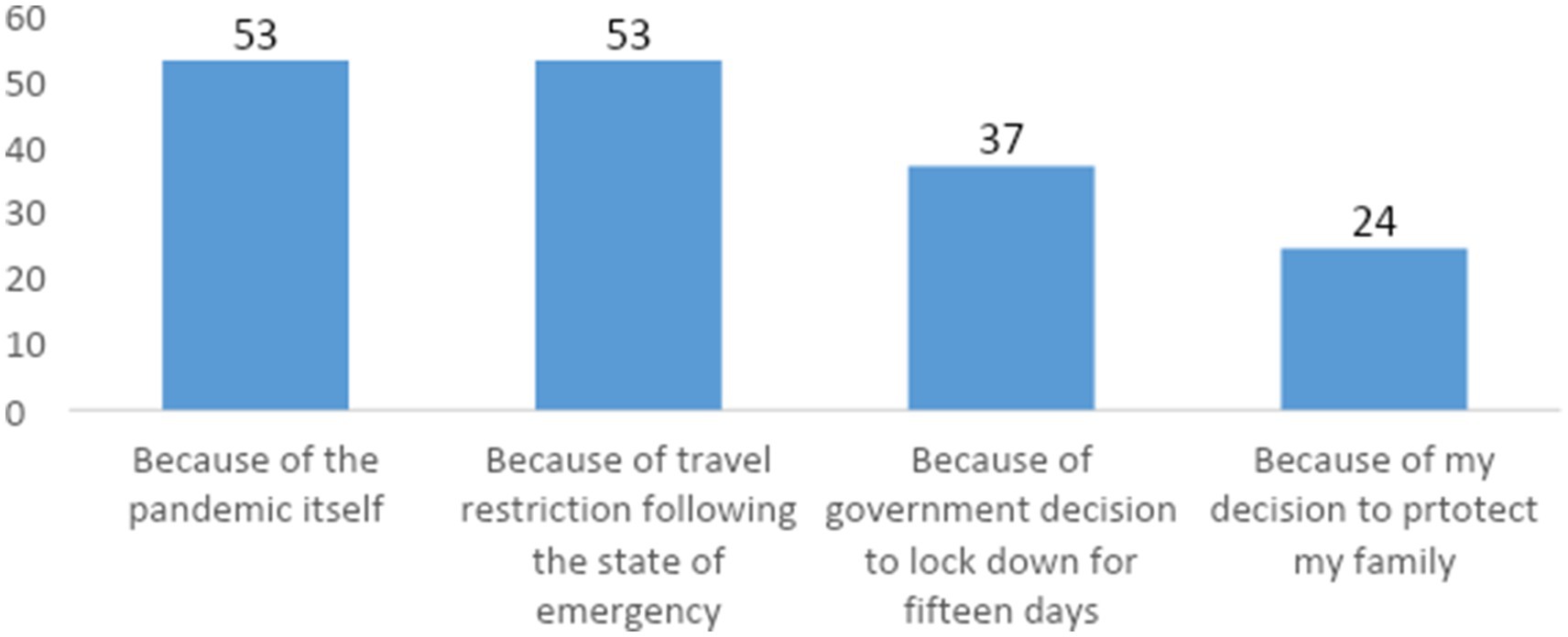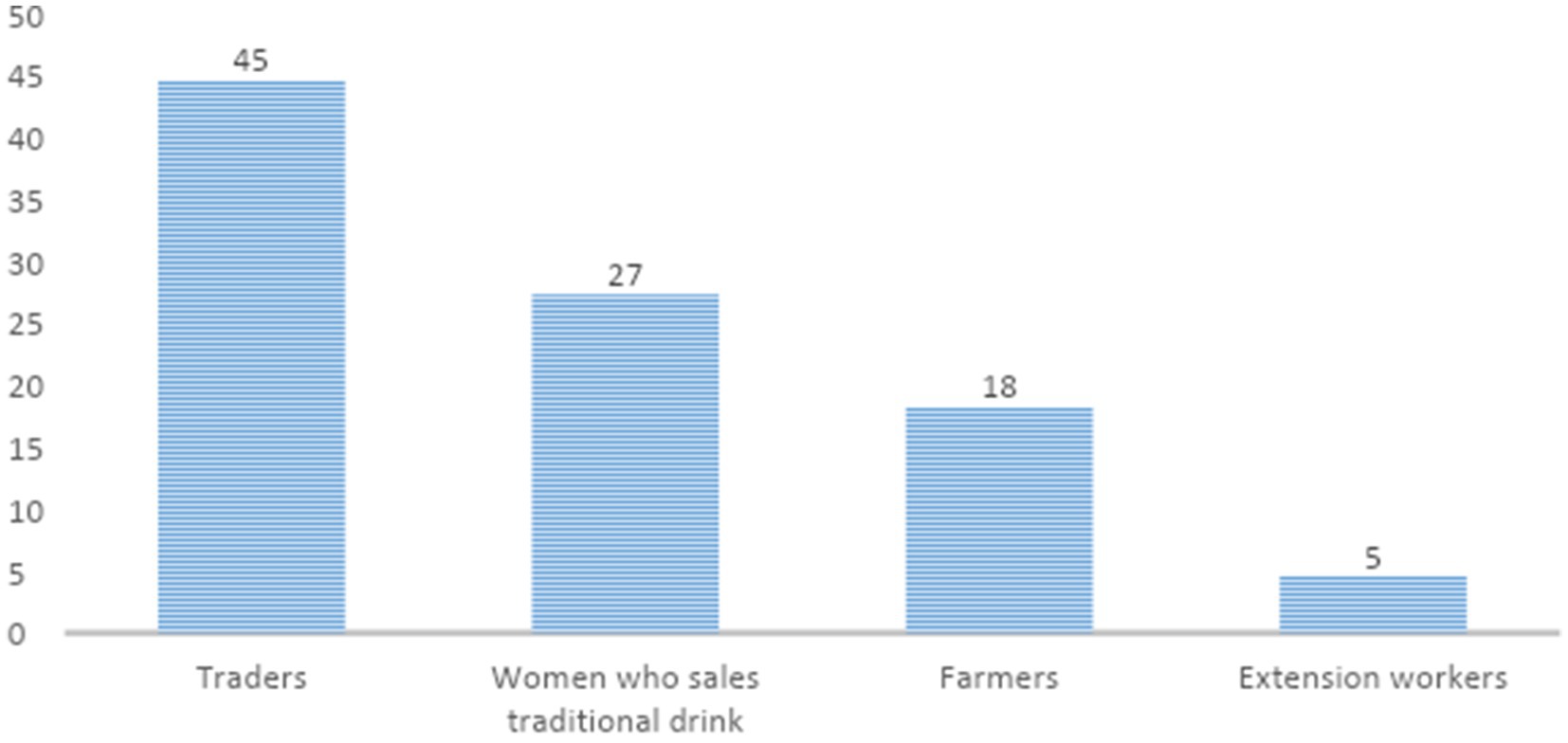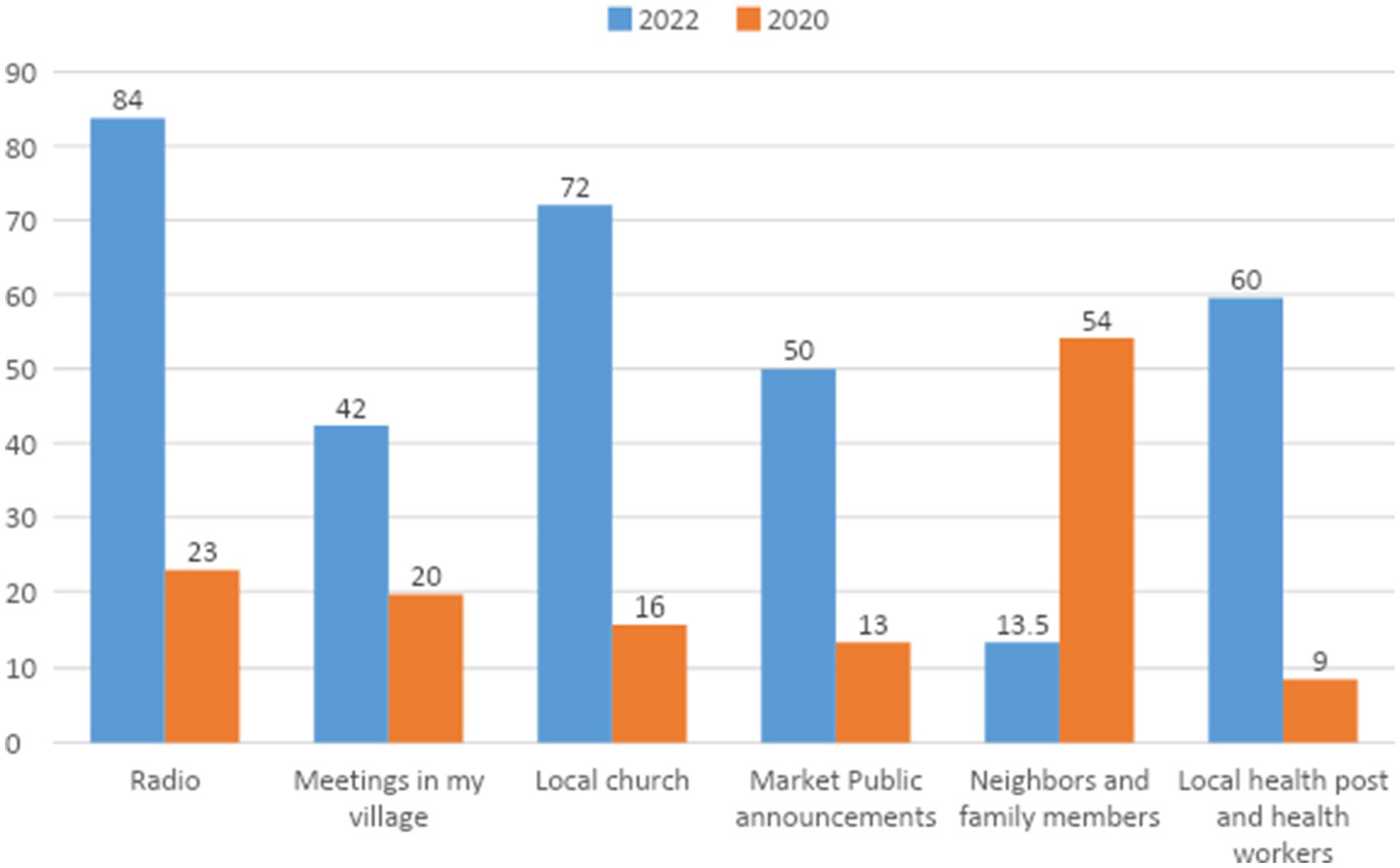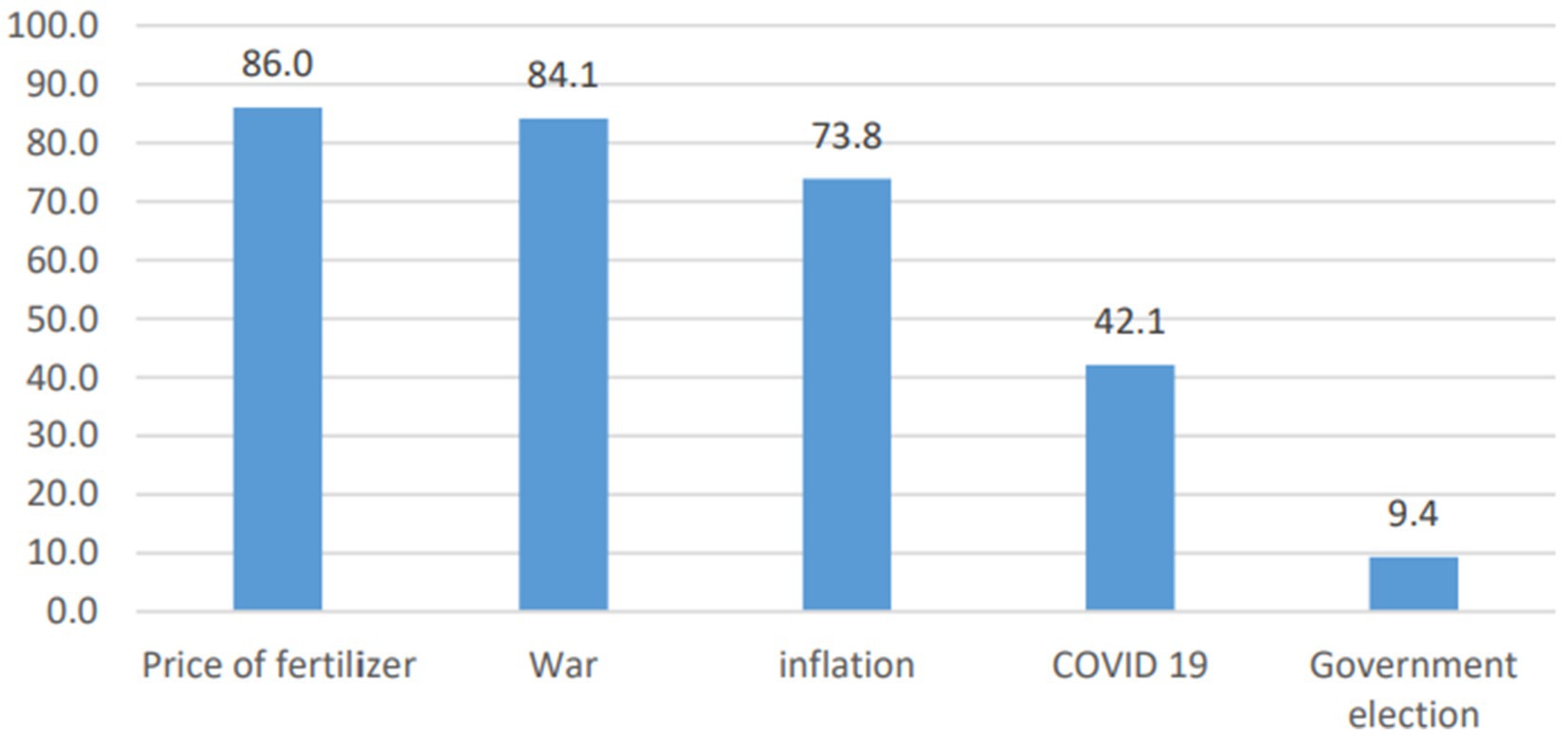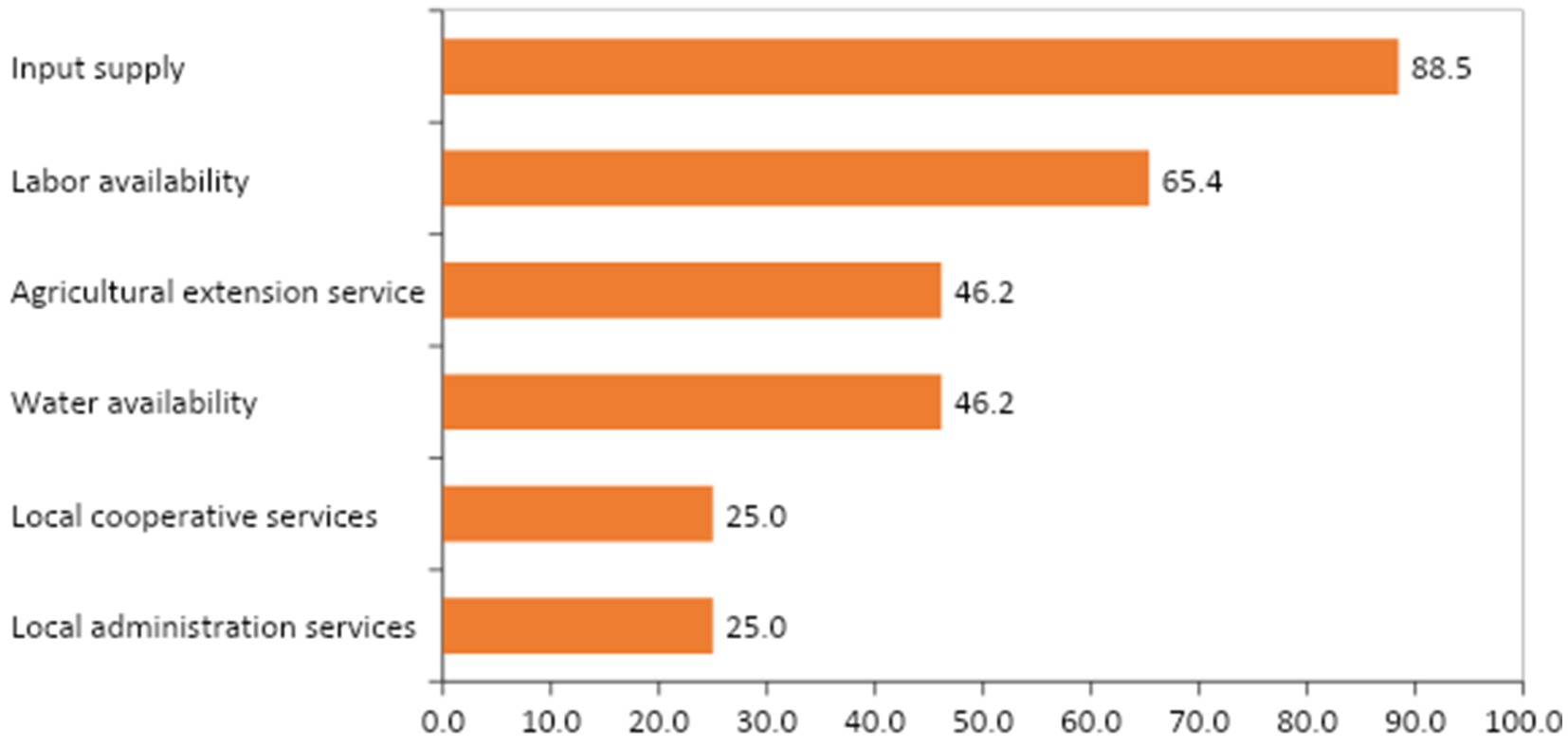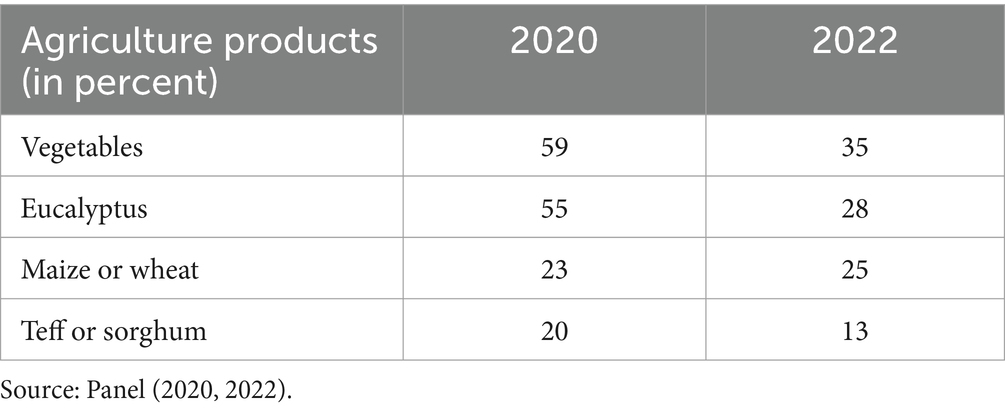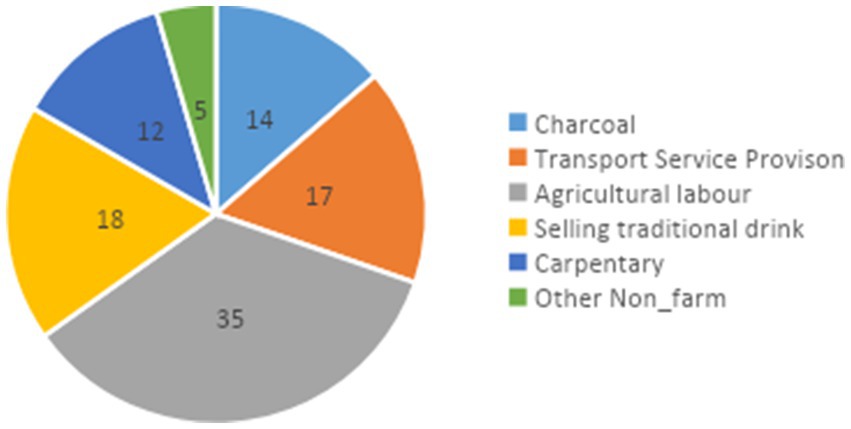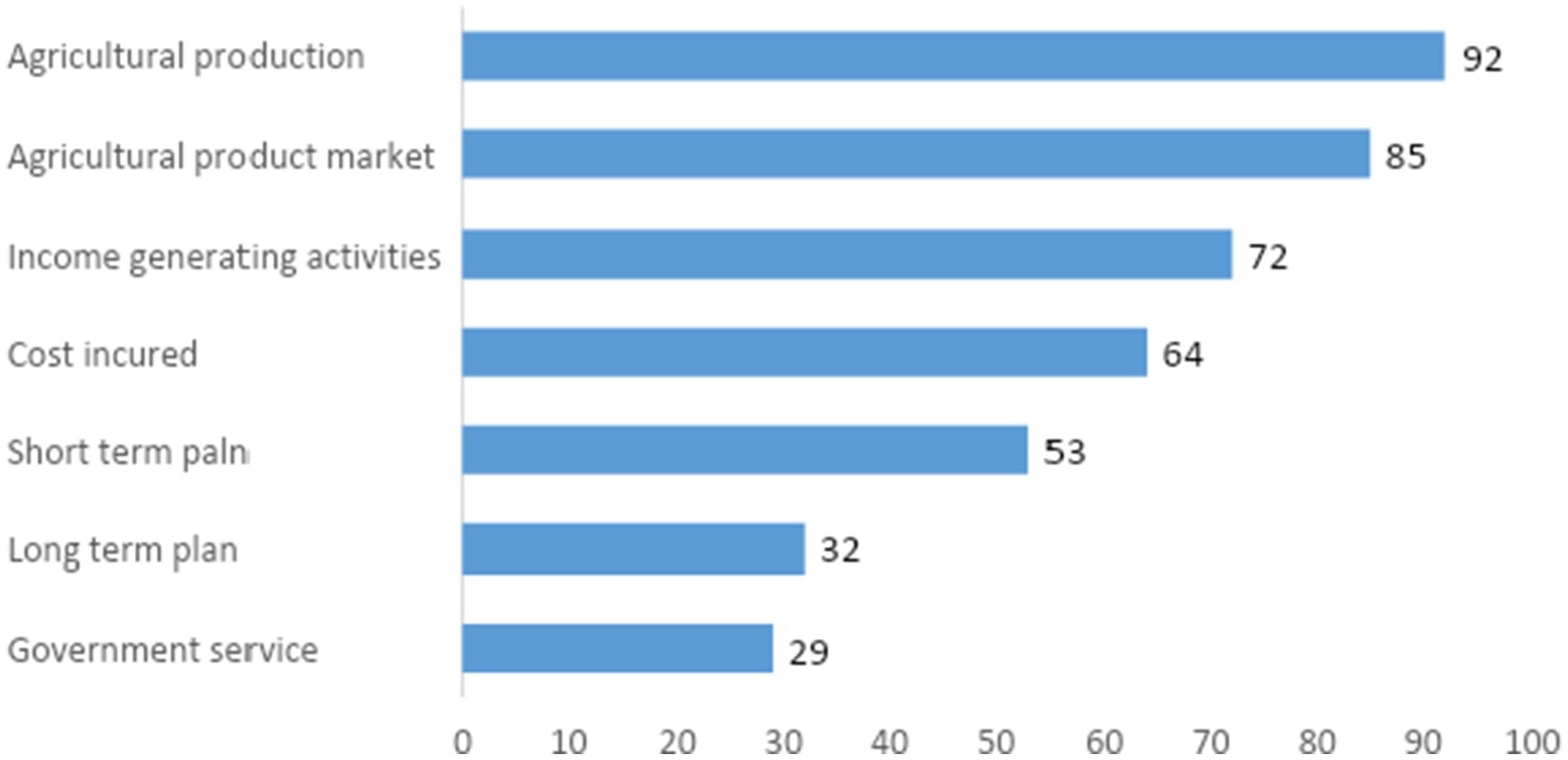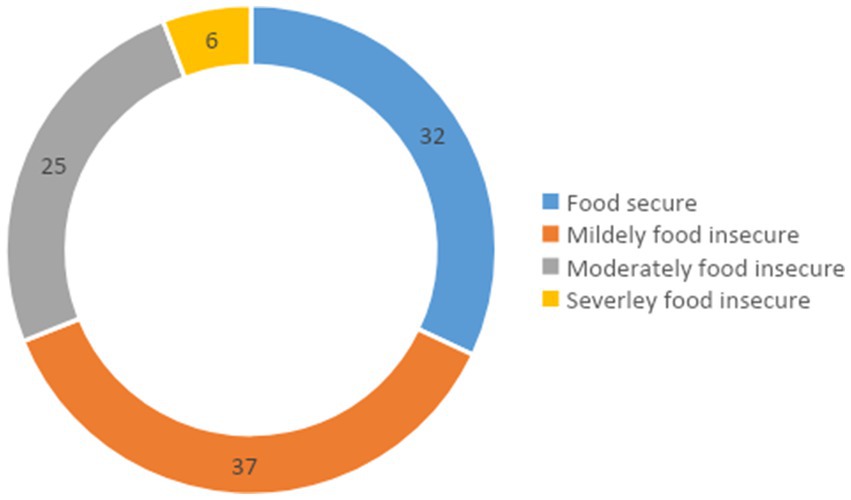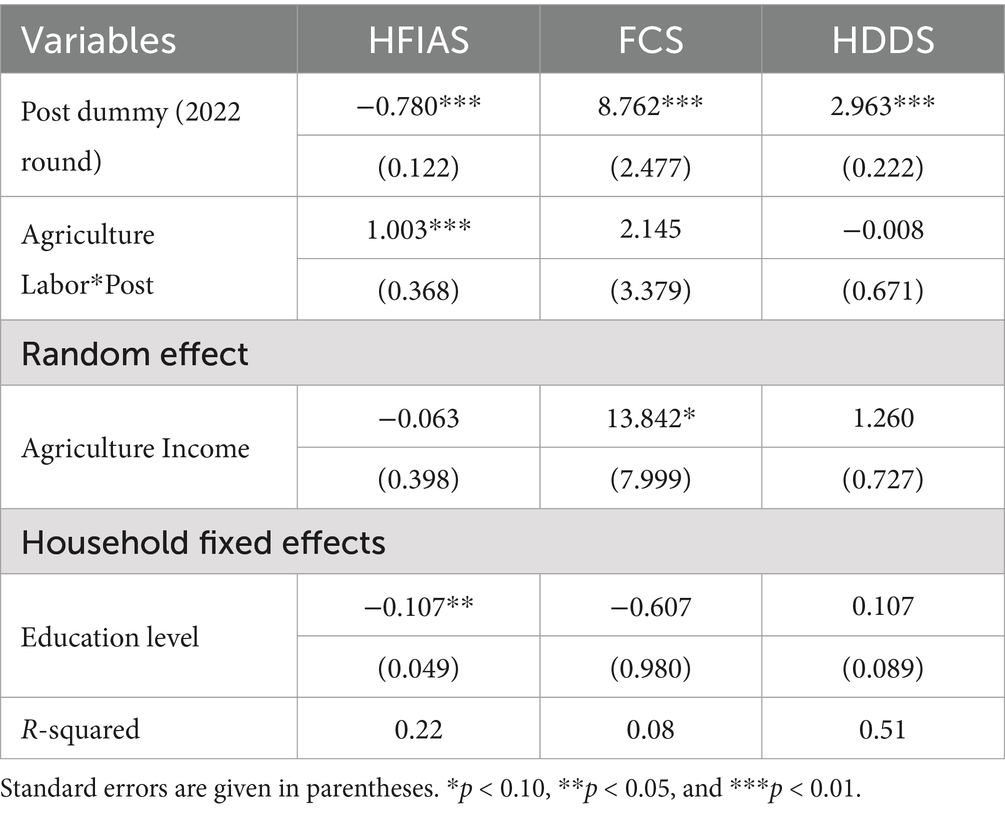- 1International Livestock Research Institute (Ethiopia), Addis Ababa, Ethiopia
- 2Institute of Geography, University of Bonn, Bonn, Germany
- 3College of Development Studies, Addis Ababa University, Addis Ababa, Ethiopia
The primary goal of this paper is to investigate the impact of COVID-19 on the livelihoods of smallholder farmers in Ethiopia. The study focused on how the pandemic impacted farmers’ access to markets, inputs, and labor, as well as their income and food security. The primary data consisted of panel data collected in three waves between 2018 and 2022. The three waves of data included pre-pandemic face-to-face interviews in August 2018, followed by phone surveys in June 2020 and November 2022. The study included a sample of 107 households from eight villages. The quantitative data was analyzed using descriptive statistics and an econometric analysis of difference-in-difference (DID) technique. The results show that the majority of farmers (76.6%) reported that COVID-19 has had a significant impact on their ability to purchase food from the market due to a variety of factors, including increased prices, limited availability of certain food items, disruption in supply chains, or reduced income for purchasing food. Disruptions in income-generating activities seriously affected farmers and their families, including financial hardship and food security concerns. Hence, 37, 32, 25, and 6 percent of farmers were mildly food secure, mildly food insecure, moderately food insecure, and severely food insecure, respectively. Reduction in household income was one of the most critical challenges farmers faced during the outbreak of the COVID-19 pandemic that affected food insecurity. As expected, the spread of the pandemic significantly reduced agricultural labor participation. Hence, households relying on income from agricultural labor have experienced worsened food insecurity. This suggests that the reduction in agricultural labor opportunities, potentially due to restrictions or disruptions caused by the pandemic, has had a negative impact on the food security of these households.
Introduction
The COVID-19 pandemic had significant impacts on health and food systems across the globe. In response, governments imposed a range of measures to contain the spread of the virus, such as social distancing, restrictions on mobility, and the temporary closure of workplaces, or “lockdowns” (Devereux et al., 2020). Consequently, the COVID-19 pandemic has significantly impacted the global economy, and Ethiopia has not been exempt from its effects.
In Ethiopia, the first recorded case of COVID-19 was confirmed in Addis Ababa on March 13, 2020. Since then, the virus spread to all 11 regions. By mid-October 2020, the number of confirmed cases had surpassed 89,000, resulting in over 1,350 confirmed deaths. Addis Ababa accounted for about 53% of the confirmed cases, with other heavily affected regions including Oromia (13.5%), Tigray (8%), Amhara (7%), and SNNPR (4%) (Abay et al., 2020b).
The Ethiopian government implemented several measures to slow the transmission of the virus. These included restrictions on people’s movement, the closure of schools, and orders to stay at home. These measures culminated in the declaration of a state of emergency on April 8, 2020. Before that, various restrictions were imposed, such as prohibiting overcrowded public transportation and large gatherings. Primary and secondary schools were closed, and universities and colleges followed suit on March 16, 2020. Domestic travel restrictions were enforced on March 21, 2020, and the movement of people across all borders was halted on March 22, 2020. On March 23, 2020, mandatory quarantine measures were imposed for international travelers, and stay-at-home or shelter-in-place orders were implemented. In rural Ethiopia, several regional governments imposed restrictions on public transportation and other vehicle movement between towns and rural areas (Hirvonen et al., 2021).
A state of emergency was declared on April 8 at the federal level. Land borders were closed, except for cargo. Facemasks became compulsory in public spaces. Restrictions on cross-country public transportation and city transportation were also declared; for example, the carrying capacity of public transportation providers was limited to half of their normal capacity. Some administrative regions, like the Amhara Regional State, took even stricter measures by closing restaurants and limiting movement between rural and urban areas. Adherence to these measures and other recommended virus prevention practices was reportedly high (Hirvonen et al., 2021). Unlike other countries in the region, Ethiopia never went into a total lockdown that severely restricted movement or imposed curfews (Arndt et al., 2020). However, the pandemic severely disturbed the economy, including agriculture, a crucial sector of the country’s economy. Smallholder farmers, who comprise most of the agricultural sector, have been particularly vulnerable to the economic shocks caused by the pandemic (Asegie et al., 2021).
Smallholder farmers in Ethiopia have generally been vulnerable to economic shocks caused by pandemics and other crises (Aragie et al., 2020; Tofu et al., 2022). Because government measures to control the spread of the virus, such as lockdowns and travel restrictions, limited farmers’ access to markets, inputs, and labor, the unprecedented crisis affected the livelihoods of smallholder farmers across the country (Abagero et al., 2022). As a consequence, COVID-19 caused significant disruptions to the food system, decreasing the supply and demand for agricultural products, and causing lower prices for farmers (Abay et al., 2020b). Despite the importance of smallholder farmers for Ethiopia’s economy, and the detrimental impact of COVID-19 on their livelihoods, the question how the pandemic affected their livelihoods has so far not been sufficiently addressed in scientific research. This is where this current study wants to make a contribution. It addresses the following research questions:
• How has the COVID-19 pandemic disrupted the local food system and impacted the livelihoods of smallholder farmers in Ethiopia, specifically in terms of their access to markets, inputs, and labor, as well as their income and food security?
• What are the challenges that smallholder farmers in Ethiopia have faced as a result of the COVID-19 pandemic?
• How has the pandemic affected smallholder farmers’ access to markets, inputs, and labor?
• What has been the impact of the pandemic on smallholder farmers’ income and food security?
• What policy responses have been implemented to support smallholder farmers in Ethiopia during the pandemic, and how effective have these responses been?
This study is significant for several reasons. First, it provides insights into the challenges faced by smallholder farmers in Ethiopia during the COVID-19 pandemic and how these challenges have affected their access to markets, inputs, labor, income, and food security. Second, this study contributes to the knowledge on the impact of the COVID-19 pandemic on smallholder farmers in Africa, and specifically in Ethiopia. This research will also provide a basis for future research on the topic, together with some practical recommendations for policymakers, development practitioners, and other stakeholders.
Literature review
Previous studies have highlighted the vulnerability of smallholder farmers in Ethiopia to economic shocks caused by crises such as droughts and food price spikes. These studies highlighted the importance of smallholder farmers to Ethiopia’s economy, and their precarious livelihoods. However, research on how the COVID-19 pandemic affected these vulnerable groups is limited.
Several studies explored the impact of the pandemic on agriculture in other countries. For example, Kansiime et al. (2021) found that COVID-19 disrupted the food supply chain in Uganda, resulting in decreased demand for agricultural products and lower prices for farmers. Inegbedion (2021) showed that the COVID-19 lockdown significantly constrained farm labor, transportation, and security in Nigeria, while food security was threatened by insufficient labor, transportation, farmers’ morale, and farm coordination. Harris et al. (2020) showed that the impact of COVID-19 and subsequent government policies to slow down the pandemic resulted in the rolling back of India’s previous impressive economic gains. Abay et al. (2020a) proved that COVID-19 affected mothers’ and children’s diets in Ethiopia by changing the composition of their diets, because the consumption of animal-source foods declined. Mahmud and Riley (2021) demonstrated in a study on rural Uganda, that the COVID-19 lockdown’s adverse effects were more significant for households that were relatively wealthier. Yegbemey et al. (2021) found that the pandemic has affected smallholder farmers in Nigeria by limiting their access to inputs and labor. The literature review clearly indicates that the main impact of the COVID-19 pandemic on smallholder farmers’ livelihoods was the disruption of supply chains and the decline of food security. Still, more research is needed to understand the specific impacts of the pandemic on livelihood assets, and to identify suitable policy responses in support of local livelihoods.
The theoretical framework for this study on the impact of COVID-19 on the livelihoods of smallholder farmers in Ethiopia draws from several theoretical perspectives. First, the study refers to the concept of vulnerability, which is central to understanding the challenges faced by smallholder farmers in Ethiopia during the pandemic. From food systems point of view, vulnerability is understood as “the risk of a system being exposed to adverse events and falling into vicious loops that jeopardize food security and other desirable food system outcomes” (Zurek et al., 2022). Smallholder farmers in Ethiopia are particularly vulnerable to the economic shocks caused by the pandemic due to their limited resources and lack of access to support services. Second, the study draws on the concept of food system resilience, which refers to the ability of the food system actors to adapt their activities to resist disruptions, adapt their activities to return to desired outcomes following disruption and when needed accepting alternative food system outcomes after disruption (Zurek et al., 2022). Resilience is particularly relevant in the COVID-19 pandemic, as smallholder farmers in Ethiopia need to adapt to changes in the availability of inputs, labor, and markets to maintain their livelihoods. The resilience approach draws on the social-ecological systems (SES) framework, which emphasizes the interdependence of social and ecological systems (Berkes and Ross, 2013). The SES framework is particularly relevant for smallholder farmers in Ethiopia, as their livelihoods are closely linked to the natural environment. The framework highlights the need for integrated and collaborative approaches to addressing the challenges faced by smallholder farmers that consider the complex interactions between social and ecological systems.
The theoretical framework for this study emphasizes the importance of understanding the vulnerabilities and resilience of smallholder farmers in Ethiopia in the context of the COVID-19 pandemic and highlights the need for integrated and collaborative approaches to supporting their livelihoods. The framework guided the research question, objectives, and methodology of the study and the analysis and interpretation of the findings.
Empirical studies on the impact of COVID-19 on the livelihoods of smallholder farmers in Ethiopia highlighted several key findings. These studies used a range of research methods, including surveys, interviews, and case studies, to examine the effects of the pandemic on smallholder farmers.
One key finding is the impact of COVID-19 on the availability of inputs, particularly seeds and fertilizers. Kassie et al. (2020) found that the pandemic had disrupted the supply chain of agricultural inputs, leading to shortages and increased prices which has significantly impacted smallholder farmers, who rely on these inputs for their livelihoods. Another key finding is the impact of COVID-19 on access to labor. Many smallholder farmers in Ethiopia rely on seasonal migrant workers to help with planting and harvesting. However, the pandemic led to restrictions of the movement of people, making it difficult for farmers to access the labor they need. Tefera et al. (2022) found that many smallholder farmers had to rely on family members for labor during the pandemic, which increased the workload and reduced productivity. Furthermore, the pandemic had a significant impact on the markets for agricultural products. Underhill et al. (2023) found that the pandemic reduced demand for agricultural products, particularly for high-value crops such as vegetables, due to the increased market price. This reduced income for smallholder farmers, who are already vulnerable to market fluctuations.
Previous studies on the impact of COVID-19 on the livelihoods of smallholder farmers in Ethiopia used a range of econometric analysis methods to examine the effects of the pandemic on agricultural production, income, and food security, including regression analysis, propensity score matching, and difference-in-differences analysis. Regression analysis is a commonly used method for examining the relationship between a dependent variable and one or more independent variables. Several studies applied regression analysis to examine the impact of COVID-19 on agricultural production and income. For example, Kassie et al. (2020) used a regression analysis to examine the effect of COVID-19 on the availability and prices of agricultural inputs in Ethiopia. Propensity score matching is a method for comparing outcomes between two groups that are not randomly assigned. Several studies used propensity score matching to examine the impact of COVID-19 on smallholder farmers compared to other groups. For example, Tefera et al. (2022) used propensity score matching to compare the impacts of COVID-19 on smallholder farmers and urban households in Ethiopia. Difference-in-differences analysis is a method for comparing changes in outcomes between two groups over time. This method was used to examine the impact of COVID-19 on Ethiopia’s agricultural production and food security.
We use food system resilience as a conceptual framework for our paper. Food system resilience refers to “the ability of the different individual and institutional actors of the food system to maintain, protect, or successfully recover the key functions of that system despite the impacts of disturbances” (Béné et al., 2023, p. 1438). Embarrassing the likelihood assets as key capabilities, the resilience lens for COVID-19 pandemic impacts would help us to uncover the interplay of structural issues (such as politics) with shocks and stressors (such as the pandemic) (Béné, 2020).
A critical analysis of previous studies on the impact of COVID-19 on local livelihoods highlights several key issues and gaps in the literature. While these studies provide important insights into the challenges faced by smallholder farmers during the pandemic, several prevailing limitations should also be taken into account. One key limitation of previous studies is their reliance on cross-sectional data. Many studies have used survey data collected during the pandemic to examine the impact of COVID-19 on smallholder farmers. While this data provides valuable insights into the immediate effects of the pandemic, it may not capture longer-term impacts or changes in response to policy interventions. Finally, there is a need for more research on the longer-term impacts of the pandemic on smallholder farmers in Ethiopia. While the immediate effects of COVID-19 are important to understand, the pandemic may have longer-term implications for agricultural production, food security, and livelihoods. Future research should address these gaps and provide a more comprehensive understanding of the impact of COVID-19 on smallholder farmers in Ethiopia.
The contextual analysis revealed that the first recorded case of COVID-19 in Ethiopia was confirmed on March 13, 2020, in Addis Ababa. In rural Ethiopia, several regional governments, including Amhara regional state, imposed restrictions on public transportation and vehicle movement between towns and rural areas. Some administrative regions, like Amhara Regional State, took even stricter measures by closing restaurants and limiting movement between rural and urban areas.
The analysis of livelihood resources, trade-offs, and synergies reveals that the COVID-19 pandemic caused a decline in livelihood assets. Human capital can be affected due to a lack of awareness about the pandemic and imposed stay-at-home restrictions. The natural capital can be affected as the land was not cultivated using appropriate inputs due to a shortage of manual labor for land preparation in the area. The impact on financial capital was caused by restrictions of selling agricultural products due to partial lockdown and closed marketplaces. Moreover, credit and saving facilities were also closed due to the shut-down of government services. Physical capital suffered from the closure of markets, schools, and health facilities. And last but not least, social capital was severely affected by the government’s social distancing policy that prohibited the gathering of individuals.
Our analysis of institutional/organisational influences on livelihood assets and the composition of livelihood strategies showed that agricultural activities were severely hampered due to the lack of agricultural labor especially in irrigation areas, restricted market access, and lower demand for agricultural products. Analysis of livelihood portfolios and pathways revealed that households relied more on family labor, with a preference of subsistence crops for domestic consumption, not for the market. Eating stored food was the option households were left with at that time. The livelihood outcome analysis shows decreased farm income, increased food insecurity, and a general deterioration of well-being due to the COVID-19 pandemic.
Methodology
Description of the study area
The study area for this research is the Koga irrigation scheme, located south of Lake Tana in the Upper Blue Nile River Basin, Ethiopia. The scheme is specifically located near Merawi town which is located 35 km from the city of Bahir Dar. The Koga catchment is situated between 11°10′ and 11°22′ north latitude and 37°02′ and 37°17′ east longitude. It encompasses an area of 22,000 hectares at the dam site (37°08′ E and 11°20’ N) and drains into the Koga River, which is a tributary of the Gilgel Abay River in the headwaters of the Blue Nile. Ultimately, the Gilgel Abay flows into Lake Tana, the largest lake in Ethiopia. The sampling population were farmers in the irrigation scheme and a control groups in the dam area. The irrigation users produce mainly for the market, targeting not only markets in the regional capital, Bahir Dar, but also extending to markets in Addis Ababa (Gebreyes et al., 2020).
Research design
A quantitative research design was used for the study. Data for this study were primarily obtained through surveys, and through secondary sources from published reports and datasets. The primary data were collected from 2018 to 2022 in three waves, including pre-pandemic face-to-face interviews in August 2018, and two follow-up phone surveys in June 2020 and November 2022. The study population for the control group comprises 1,654 households spread across five sub-villages. For the irrigation site, the sampling population was derived from irrigation blocks within the irrigation scheme. This scheme includes 12 irrigation blocks, serving nearly 10,000 households. The two phone surveys were made possible, because coincidentally the phone numbers of respondents had been noted in the pre-pandemic survey. In this way it was possible to contact people again by phone. This allowed us to work with a sample of 107 households from eight villages, which were selected for the study. The control group for the study were the respondents from Abiyot Fana village, with a sample size of 32 (see Table 1).
Descriptive statistics and econometric analysis of difference-in-difference (DID) were employed to analyze the quantitative data. Econometric analysis was used to analyze the quantitative data to determine the causal impact of COVID-19 on the livelihoods of smallholder farmers. Regression models were used to estimate the effect of COVID-19 on food security. The panel data involved information on socio-economic characteristics, agricultural production and sales, access to markets, access to support services, government services, and the impact of COVID-19 on livelihoods.
To explore the effect of the COVID-19 pandemic on households’ food insecurity (our main livelihood outcome of interest), we exploit spatial variations in the livelihood strategies of households, being irrigation user and non-user as well as agriculture labor participation, along with the temporal variations in our outcomes of interest. We specifically estimate the following fixed effects specification to investigate the effect of the COVID-19 pandemic on the livelihood outcome of interest:
Irrigation and household food insecurity outcomes
Labor market participation and food insecurity outcomes
where Yht outcomes for each household h and round t stands for food insecurity αh captures household fixed effects, Postt is a dummy variable, assuming 1 for the post-COVID-19 round survey (2022) and 0 for the pre-COVID-19 round (2018) survey. The parameter associated with this round dummy captures aggregate trends in food security outcomes. This variable also captures aggregate potential differences in our outcomes of interest driven by differences in survey methods (face-to-face or phone survey). εht is an error term assumed to be uncorrelated with COVID-19 cases, at least conditional on household fixed effects and state-level policy responses. The household fixed effects in Equation 1 capture time-invariant heterogeneities across households. The specification in Equation 1 is a standard difference-in-difference approach, except that our treatment intensity variable is continuous.
Our identifying variation in Equation 1 comes from a combination of livelihood strategies variations in COVID-19 cases and temporal variations in our outcome of interest. The interaction term between irrigation and post-COVID-19 round survey dummy captures differential temporal evolution in food insecurity among households across livelihood strategies with varying exposure to the pandemic. We hypothesize that those households who are non = irrigation user are more likely to witness a higher increase in food insecurity as they do not have enough livelihood assets prior to the outbreak of the COVID-19 pandemic. Thus, the estimation in Equation 1 entails comparing the temporal evolution of food security outcomes for households using and not using irrigation.
The following variables have been included in the analysis:
1. Food security status: measured as the comparison of HFIAS and HDDS before and after the outbreak of COVID-19.
2. Household income change: measured as a self-reported comparison of incomes before and after the pandemic.
3. Agricultural production: measured as a self-reported comparison of agricultural production, the quantity and quality of crops, and livestock products produced by the household.
4. Market access is measured as the household’s ability to access local and regional markets to sell agricultural products.
5. Access to support services: measured as the household’s access to agricultural extension services, credit, and other forms of support from the government or non-governmental organizations.
Therefore, the survey questionnaire has been designed to collect information on food security, household income, agricultural production, market access, access to support services, and health status. The selection and measurement of variables in this study have been guided by the research question and objectives that allowed for a comprehensive analysis of the impact of COVID-19 on the livelihood our survey respondents.
Results and discussion
Descriptive results
Socio-demographic characteristics
The survey collected 107 panel data using face-to-face and phone interviews. The majority of the panel survey households are male-headed households. The composition of the education level group showed that about 40, 24, 21, 11, and 4 percent of respondents have no education, basic education, first cycle and second cycle primary, and secondary education level, respectively. To typical empirical research in rural areas of Ethiopia, 53 percent of farmers neither read nor write, 23 percent only read and write, and only 24 percent had formal education (see Table 2).
Contextual analysis
In 2020, during the peak of the spread of the COVID-19 pandemic, most respondents agreed that COVID-19 has had a significant impact on their mobility. Students were forced to return or stay home, travel to nearby towns (Merhaw) and the regional capital (Bahir Dar city) was reduced, travel to other nearby towns was affected, and family visitors from urban areas and traders from urban areas reduced visits.
Figure 1 shows, that in 2020, most respondents (53%) mentioned being impacted by the COVID-19 pandemic and travel restrictions following the state of emergency. A significant portion also mentioned the impact of the government’s decision to implement a lockdown for 15 days (37%) and their personal decision to protect their family (24%).
These findings reflect the diverse and multi-faceted impact of COVID-19 on mobility, government services, and the overall well-being of respondents. It highlights the challenges individuals and communities face due to the pandemic and the measures taken to mitigate its spread.
Figure 2 also shows that, in 2020, farmers responded that the people most seriously affected by the partial lockdown measures in society were traders (45%), women who sold traditional drinks (27%), farmers (18%), and extension workers (5%). The result aligns with the challenges businesses and commercial activities face due to restrictions on movement, closures of markets, and disruptions in supply chains during the lockdown. Women who sell traditional drinks were seriously affected due to the closure of traditional gathering places, limited social interactions, or changes in consumer behavior during the lockdown, impacting their income-generating activities. Farmers were seriously affected due to challenges in accessing inputs, labor shortages, disruptions in agricultural activities, or limitations in marketing their produce during the lockdown. Extension workers were seriously affected due to their limited ability to provide on-site support, conduct field visits, or deliver agricultural extension services during the lockdown, impacting their professional activities.
Farmers’ livelihood assets
Human capital
Figures 3, 4 show, among multiple responses of sources of information about COVID-19, a decrease in the number of people from 2020 to 2022 who get information about COVID-19 because the pandemic has subsided in recent days and community attention has been shifted towards the war in the north. In the 2022 survey, the pandemic was mentioned as a major concern only by 42% of the respondents, compared to 86% for the war in the north, 85% for fertilizer price hike and 73% for general inflation.
Natural capital
Figure 5 shows specific agricultural activities directly and indirectly affecting farmland productivity. Nearly 30% of farmers mentioned that the availability of agricultural inputs had been impacted due to limited access to seeds, fertilizers, pesticides, or other necessary farm inputs. In addition, approximately 22% of farmers stated that they had experienced labor availability challenges due to restrictions on movement, labor shortages, or the migration of workers to different areas. Around 16% of farmers reported difficulties accessing agricultural extension services that provide valuable information, guidance, and support to farmers. Some 16% of farmers mentioned that water availability had been affected due to water supply system changes and irrigation distribution facility disruptions. Approximately 8% of farmers mentioned issues with local cooperative services due to challenges in accessing credit, marketing support. Another 8% of farmers reported challenges with local administration services that encompass issues related to permits, licenses, or administrative support that farmers rely on for their operations. Hence, disruptions in various market and government services due to the pandemic affected the productivity of farmlands, affecting the livelihood of farmers.
Financial capital
The pandemic affected the livelihood of respondents through its effect on their financial capital. Approximately 85% of farmers mentioned that their agricultural product market had been affected due to reduced demand, market closures, supply chain disruptions, or transportation limitations, which can impact farmers’ ability to sell their produce. Around 72% of farmers reported that income-generating activities had been affected, aligning with the earlier challenges regarding reduced market access and disruptions in economic activities, directly impacting farmers’ income streams.
Table 3 shows, in 2020 and 2022, approximately 59 and 35% of farmers, respectively, mentioned that the sale of vegetables had been affected due to disruptions in supply chains, reduced demand from markets or consumers, or restrictions on movement that affected transportation and distribution. In 2020 and 2022, around 55 and 28% of farmers reported difficulties in selling eucalyptus due to restrictions on the cross-border trade between North Sudan and Ethiopia. In 2020 and 2022, approximately 23 and 25% of farmers stated that the sale of maize or wheat had been affected due to disruptions in supply chains, reduced demand from markets or consumers, or restrictions on movement that affected transportation and distribution. In 2020 and 2022, About 20 and 12% of farmers mentioned challenges in selling teff or sorghum. As these crops are staple grains and important cash crops, market disruptions significantly impact farmers’ incomes and food security.
Regarding COVID-19’s effect on income-generating activities, in 2022, a significant proportion of farmers have experienced disruptions in their income sources due to the pandemic. For transport provision, approximately 53% of farmers mentioned that their income from transport provision had been affected due to reduced travel demand, restrictions on movement, or limitations on public transportation services during the pandemic. Around 45% of farmers reported difficulties in generating income from agriculture could be attributed to challenges in accessing markets, disruptions in supply chains, reduced demand for certain agricultural products, or limitations in farming operations due to the pandemic. However, in 2020 and 2022, (90 and 7%) of farmers reported that their agriculture labor participation had been affected due to labor shortages, reduced demand for agricultural labor, or changes in agricultural activities during the pandemic.
COVID-19 incurred additional costs for the households. Transport costs to town and expenses for children out of school were the most significant ones. Households have incurred increased transportation costs when traveling to town due to reduced public transportation options, increased fuel prices, or the need to adhere to social distancing measures while commuting. These additional expenses can strain household budgets. Another significant cost mentioned is the expense incurred when children are out of school because the disruption of regular schooling due to the pandemic has added financial burdens to households. As a result of these additional costs and the decrease in income-generating activities, it is understandable that household incomes were affected.
Approximately 85% of respondents mentioned that they incurred additional costs due to COVID-19. respondents stated they incurred additional costs due to increased transportation costs, price hikes on consumer goods, increased expenses on out-of-school children and robbery due to limited low enforcement These costs can significantly impact household budgets and financial stability during these challenging times. Hence, it is reported that 54% of respondents reported a change in income due to COVID-19. Among those who experienced changes, 47% mentioned experiencing a lot less income.
Physical capital
Figure 5 shows the institutional and physical capital affected by COVID-19. Respondents stated COVID-19 affected the government services they receive, among them include water distribution services (37.8%). The technicians who were opening irrigation canel gates were not unable to travel to all the places to open and close the gates. Access to reliable water is crucial for irrigated agricultural activities, and disruptions in water distribution services significantly impacted farmers.
Social capital
Approximately 60% of the respondents mentioned that their social relations had been affected by the pandemic. The travel restrictions and the increase in transportation cost limited respondent’s mobility to the urban area to visit family and friends. During the initial period, there were also pressures from the local administration to limit religious gatherings. In addition, the reduced travel and social engagement during market days aggravated the social impact of the pandemic. Social relations play a vital role in rural communities, and the disruptions caused by COVID-19, such as physical distancing measures or limited social interactions, can lead to isolation and impact social support networks.
Livelihood strategies
Regarding the livelihood strategies, all depend on agriculture, while 35, 18, 17, 14, 12, and 5 percent of the panel additionally engaged in off-farm and non-farm activities such as agricultural labor, charcoal making, transport service provision, selling traditional drink, carpentry and other, non-farm activities, respectively (see Figure 6).
Farmers reported that they could not sell in the market, and the food items they needed from the market were not accessible. The majority of farmers (76.6%) reported that COVID-19 has significantly impacted their ability to purchase food from the market due to various factors, such as increased prices, limited availability of certain food items, disruptions in supply chains, or reduced income for purchasing food. Thus, the COVID-19 pandemic and associated measures have had broad economic implications, affecting various sectors and livelihoods. The disruptions in income-generating activities can have significant consequences for farmers and their families, leading to financial hardships and food security concerns. Hence, 37, 32, 25, and 6 percent of farmers were mildly food secure, moderately food insecure, and severely food insecure, respectively.
In the panel data, most farmers (92%) reported that their agricultural production activities had been affected. This included disruptions in input supply (29.9 percent), labor availability (22.1 percent), agricultural extension services (15.6 percent), irrigation water availability (15.6 percent), local cooperative services (8.4 percent), and local administration services (8.4 percent).
For short-term and long-term plans, a significant proportion of respondents (53% for short-term and 32% for long-term plans) acknowledged that COVID-19 has affected their plans. This indicates the need for farmers to adapt their strategies and adjust their goals to navigate the challenges posed by the pandemic. Regarding long-term plan change, about 32 percent said COVID-19 made them change their plans for themselves and their family. About 94 percent said COVID-19 had affected the future of education of his/her children and has affected the crops that he/she grow, 85 percent said COVID-19 had affected the income they earn, and 58 percent said COVID-19 had affected his/her social relations.
Government services approximately 29% of respondents reported that government services were affected. Governments, relevant agencies, and stakeholders must address these challenges and support farmers during these difficult times (Figure 7).
Food security
The food security status result showed that 32 of households are food secure while 37, 25, and 6% of the households are mildly, moderately, and severely food insecure, respectively. This result shows that more than three fourth (78%) of the households were food insecure due to the effects that COVID-19 has brought to the respondents (Figure 8).
Effect of COVID-19 on households’ anxiety and uncertainty about household food access
Table 4 indicate the level of frustration and despair about respondents’ daily food consumption comparing scenarios in 2018 and 202. The HFIAS occurrence questions relate to three different domains of food insecurity (access) found to be familiar to the cultures examined in a cross-country literature review (Maxwell et al., 2013). The questionnaire first asked respondents about their anxiety and uncertainty about their household food supply. Then it asked about insufficient food quality. And finally, it asked about insufficient food intake and its physical consequences. Hence, compared to the survey period in 2018, in 2022, 46. Six percent of the households were worried and uncertain about the household food supply in 2022, 12 percent said that due to lack of resources, they were not able to eat the kinds of foods they preferred and 4 percent said they had to eat some foods that you did not want to eat. Hence, compared to 2018, in 2022, more households were obliged to eat insufficient quality food (including variety and preferences of the type of food). In the same line, 15.5 percent said they had to eat a smaller meal than they felt they needed, 13.6 percent said they had to eat fewer meals in a day because there was not enough food. These results are indicative of the consequential impacts of COVID-19 on household food insecurity.
Econometric results
Food security outcomes
In this section, we present estimation results for Equations 1 and 2 indicate how food security outcomes have varied with livelihood strategies. Table 5 shows the effect of the COVID-19 pandemic on livelihood outcomes of food insecurity, measured by the Food Insecurity Access Scale (HFIAS), Household Dietary Diversity Score (HDDS), and Food Consumption Score (FCS). The interaction between the irrigation variable and the post-COVID-19 dummy captures the livelihood strategies variation in the evolution of our outcomes of interest associated with varying exposure to the spread of the pandemic. A positive and significant coefficient shows that irrigation users are likely to experience greater increases in the probability of food insecurity relative to pre-COVID-19 period. Hence, the negative pre-post variable coefficient for HFIAS, show that compared to the pre-COVID-19 period, the food security level of the irrigation users and non-users households has improved in the past 4 years. Similarly, the HDDS coefficient for the pre-post variable shows that the post-COVID-19 period has better food quality consumed than the pre-COVID-19 period. However, for irrigation users, the COVID-19 pandemic has worsened food insecurity outcomes compared to non-irrigation households.
These findings are concurrent with several literatures such as FAO et al. (2020) that reported the disruptions in food supply chains and changes in market dynamics made irrigation users vulnerable to food insecurity. In addition, Adhikari et al. (2021) reported that the effect of COVID-19 on irrigation users, including reduced access to inputs, changes in cropping patterns, and financial constraints. Similarly, IFPRI (2020) reported that irrigation users faced challenges such as disruptions in input supply, labor shortages, and market disruptions during COVID-19 pandemic.
Furthermore, the random effect of agricultural income has shown that households with better agricultural income have better food security outcomes than those with less agricultural income. Regarding food consumption and quality, the post-COVID-19 food security outcome is better than the pre-COVID-19 period. The plausible explanation could be due to the partial lockdown and inaccessibility of marketplaces; households turned their market surplus production to their food consumption. This finding is supported by Abay et al. (2020b), who reported that children consumed more dietary diversity food than in the pre-COVID-19 period as a result of disruptions in some value chains, particularly those perishable foods that rural households typically produce for markets (e.g., fruits, vegetables, eggs), as these foods are temporarily consumed at home.
Labor market participation outcomes
Reduction in household income was one of the most critical challenges farmers faced during the outbreak of the COVID-19 pandemic, that can affect food insecurity. As expected, the spread of the pandemic is associated with a significant reduction in agriculture labor participation. The interaction term in column 1 of Table 5 shows that households who earn their income from agriculture labor are associated with an increase in food insecurity due to the outbreak of the COVID-19 pandemic. The second and the third columns present the quality and quantity of food consumption, which shows significantly increased food insecurity. The analysis in Table 4 shows that the spread of the pandemic is associated with a significant decrease in agricultural labor participation, as indicated by the interaction term in column 1. This implies that households relying on income from agricultural labor are more likely to experience an increase in food insecurity due to the outbreak of the COVID-19 pandemic. This suggests that the reduction in agricultural labor opportunities, potentially due to restrictions or disruptions caused by the pandemic, has had a negative impact on the food security of these households.
This findings supports, labor shortages caused by illness and movement restrictions have significantly affected agricultural activities, as documented by Amare et al. (2021). The reduced availability of labor has further aggravated the challenges faced by farmers. These disruptions have had a cascading effect on price fluctuations and income losses for farmers, as outlined by Abay et al. (2020a). Hence, vulnerable communities, households relying on income from agricultural labor, have been disproportionately impacted by these challenges, potentially leading to increased levels of food insecurity and malnutrition, as emphasized by the FAO et al. (2020) and Abay et al. (2020a) (see Table 6).
Conclusion
With regard to the theoretical implication of the study, the findings of the study contributes to the growing debate on food system resilience under shocks and stressors. The proxy for the “actual resilience” (Béné et al., 2023), the results in the food security assessment indicates that households whose livelihood depends on the labor market, those who are less endowed with resources and those with risky livelihood strategies such as irrigation were more food insecure. The resilience lens helps us to unpack the resilience capacities (Meuwissen et al., 2019) or lack of them, “the different assets that actors of the food system have at their disposal that they may or may not use in response to a crisis/shock.” Better off farmers had either enough food at home or could purchase from the market. Those who depend on the labor market had bad terms of exchange to purchase enough food for their families. Farmers whose livelihood depends on irrigation faced market disruption due to the travel restriction. From the food systems resilience point of view, this findings reinforce the argument that food insecurity is a function of not only food production, but also ability to access food through capabilities such as finance (Ansah et al., 2019).
The system lens highlights the importance of all the actors in the food production domain (Meuwissen et al., 2019), such as extension workers, input providers, irrigation water distributors, transporters, in mediating households’ food security. Food systems resilience are, hence, the result of not only disruptions in primary production, but also all other complementary services that farmers need for their food production (Tendall et al., 2015).
The food system resilience lens allows to see beyond the immediate effect of the pandemic on current food security, towards the “long term” and “ripple” effects of the pandemic (Speranza et al., 2014; Béné, 2020). First of all, as elsewhere in most African countries, the impact of the pandemic on food security of households in the study area was not because of the pandemic itself, but because of the various restrictions imposed by the government (Béné, 2020). Second, some of the decisions and restrictions by the government have had far reaching consequences for livelihoods and food security in the study area as well as the country at large. Some argued that the pandemic led to political opportunism and even authoritarianism in Ethiopia (Østebø et al., 2021). The most consequential decision was the postponement of the national election following the pandemic that marked the beginning of bloody conflict in Ethiopia, affecting food systems not only in the study areas but the nation at large (Assefa and Wami, 2023).
With regard to the practical implications of the study, the pandemic has significantly reduced household income, posing a major challenge for farmers who relay on agricultural labor as livelihood strategies. This highlights the vulnerability of certain livelihood orientations during times of crisis. It is crucial to understand these variations to develop targeted interventions and support measures that address each livelihood orientation’s specific needs and vulnerabilities (Béné, 2020). Respondents identified the disruption of government services, such as extension and court services, affecting their ability to access support and resources. Some households have responded to the pandemic by redirecting their market surplus agricultural production for their food consumption, demonstrating adaptive behaviors to address the challenges imposed by the lockdown measures and market disruptions (Ansah et al., 2019). These findings underscore the need for targeted interventions, support programs, and policy measures to address the specific challenges faced by different livelihood orientations.
Data availability statement
The raw data supporting the conclusions of this article will be made available by the authors, without undue reservation.
Ethics statement
Ethical review and approval was not required for the study on human participants in accordance with the local legislation and institutional requirements. Written informed consent from the (patients/participants OR patients/participants legal guardian/next of kin) was not required to participate in this study in accordance with the national legislation and the institutional requirements.
Author contributions
MG: Writing – review & editing, Writing – original draft, Supervision, Methodology, Formal analysis, Conceptualization. DM-M: Writing – review & editing, Writing – original draft, Resources, Investigation, Conceptualization. AT: Writing – review & editing, Writing – original draft, Formal analysis, Data curation, Conceptualization. BS: Writing – original draft, Writing – review & editing, Validation, Supervision.
Funding
The author(s) declare that financial support was received for the research, authorship, and/or publication of this article. This research was funded by the German Research Foundation (Deutsche Forschungsgemeinschaft).
Conflict of interest
The authors declare that the research was conducted in the absence of any commercial or financial relationships that could be construed as a potential conflict of interest.
Publisher’s note
All claims expressed in this article are solely those of the authors and do not necessarily represent those of their affiliated organizations, or those of the publisher, the editors and the reviewers. Any product that may be evaluated in this article, or claim that may be made by its manufacturer, is not guaranteed or endorsed by the publisher.
References
Abagero, A., Ragazzoni, L., Hubloue, I., Barone-Adesi, F., Lamine, H., Addissie, A., et al. (2022). A review of COVID-19 response challenges in Ethiopia. Int. J. Environ. Res. Public Health 19:11070. doi: 10.3390/ijerph191711070
Abay, K., Berhane, G., Hoddinott, J., and Tafere, K. (2020a). COVID-19 and food security in Ethiopia: do social protection programs protect? Washington, DC: World Bank.
Abay, K., Tesfay, G. B., Hoddinott, J., and Tafere, K. (2020b). COVID-19 and food security in Ethiopia: do social protection programs protect? Partnership for economic policy working paper No. 2020–23. doi: 10.2139/ssrn.3903364
Adhikari, J, Timsina, J, Khadka, SR, Ghale, Y, and Ojha, H. (2021). COVID-19 impacts on agriculture and food systems in Nepal: Implications for SDGs. Agric Syst. 186:102990. doi: 10.1016/j.agsy.2020.102990
Amare, M., Abay, K. A., Tiberti, L., and Chamberlin, J. (2021). COVID-19 and food security: Panel data evidence from Nigeria. Food Policy, 101:102099. doi: 10.1016/j.foodpol.2021.102099
Ansah, I. G., Kodwo, C. G., and Ihle, R. (2019). Resilience and household food security: a review of concepts, methodological approaches and empirical evidence. Foods Secur. 11, 1187–1203. doi: 10.1007/s12571-019-00968-1
Aragie, E., Taffesse, A. S., and Thurlow, J. (2020). Assessing the short-term impacts of COVID-19 on Ethiopia’s economy: External and domestic shocks and pace of recovery. Washington, DC: International Food Policy Research Institute (IFPRI).
Arndt, C., Davies, R., Gabriel, S., Harris, L., Makrelov, K., Robinson, S., et al. (2020). COVID-19 lockdowns, income distribution, and food security: an analysis for South Africa. Glob. Food Secur. 26:100410. doi: 10.1016/j.gfs.2020.100410
Asegie, A. M., Adisalem, S. T., and Eshetu, A. A. (2021). The effects of COVID-19 on livelihoods of rural households: South Wollo and Oromia Zones, Ethiopia. Heliyon 7:e08550. doi: 10.1016/j.heliyon.2021.e08550
Assefa, T., and Wami, W. (2023). Policy and political implications of government responses to COVID-19 in Ethiopia. Territ. Politics Gov. 11:951. doi: 10.1080/21622671.2022.2156917
Béné, C. (2020). Resilience of local food systems and links to food security – A review of some important concepts in the context of COVID-19 and other shocks. Food Sec. 12, 805–822. doi: 10.1007/s12571-020-01076-1
Béné, C., Frankenberger, T. R., Nelson, S., Constas, M. A., Collins, G., Langworthy, M., et al. (2023). Food system resilience measurement: principles, framework and caveats. Foods Secur. 15, 1437–1458. doi: 10.1007/s12571-023-01407-y
Berkes, F., and Ross, H. (2013). Community resilience: toward an integrated approach. Soc. Nat. Resour. 26, 5–20. doi: 10.1080/08941920.2012.736605
Devereux, S., Béné, C., and Hoddinott, J. (2020). Conceptualising COVID-19’s impacts on household food security. Food Secur. 12, 769–772. doi: 10.1007/s12571-020-01085-0
FAOIFADUNICEFWFPWHO. (2020). The State of Food Security and Nutrition in the World 2020. Transforming food systems for affordable healthy diets. Rome: FAO.
Gebreyes, M., Bazzana, D., Simonetto, A., Müller-Mahn, D., Zaitchik, B., Gilioli, G., et al. (2020). Local perceptions of water-energy-food security: livelihood consequences of dam construction in Ethiopia. Sustainability 12:2161. doi: 10.3390/su12062161
Harris, J., Depenbusch, L., Pal, A. A., Nair, R. M., and Ramasamy, S. (2020). Food system disruption: initial livelihood and dietary effects of COVID-19 on vegetable producers in India. Food Secur. 12, 841–851. doi: 10.1007/s12571-020-01064-5
Hirvonen, K., Minten, B., Mohammed, B., and Tamru, S. (2021). Food prices and marketing margins during the COVID-19 pandemic: evidence from vegetable value chains in Ethiopia. Agric. Econ. 52, 407–421. doi: 10.1111/agec.12626
Inegbedion, H. E. (2021). COVID-19 lockdown: implication for food security. J. Agribus. Dev. Emerg. Econ. 11, 437–451. doi: 10.1108/JADEE-06-2020-0130
Kansiime, M. K., Tambo, J. A., Mugambi, I., Bundi, M., Kara, A., and Owuor, C. (2021). COVID-19 implications on household income and food security in Kenya and Uganda: findings from a rapid assessment. World Dev. 137:105199. doi: 10.1016/j.worlddev.2020.105199
Kassie, B. A., Adane, A., Tilahun, Y. T., Kassahun, E. A., Ayele, A. S., and Belew, A. K. (2020). Knowledge and attitude towards COVID-19 and associated factors among health care providers in Northwest Ethiopia. PLoS One 15:e0238415. doi: 10.1371/journal.pone.0238415
Mahmud, M., and Riley, E. (2021). Household response to an extreme shock: evidence on the immediate impact of the COVID-19 lockdown on economic outcomes and well-being in rural Uganda. World Dev. 140:105318. doi: 10.1016/j.worlddev.2020.105318
Maxwell, D., Coates, J., and Vaitla, B. (2013). How do different indicators of household food security compare? Empirical evidence from Tigray. Somerville, MA: Feinstein International Center, 1–19.
Meuwissen, M. P. M., Feindt, P. H., Spiegel, A., Termeer, C. J. A. M., Mathijs, E., Mey, Y. de, et al. (2019). A framework to assess the resilience of farming systems. Agricultural Systems. 176:102656. doi: 10.1016/j.agsy.2019.102656
Østebø, M. T., Østebø, T., and Tronvoll, K. (2021). Health and politics in pandemic times: COVID-19 responses in Ethiopia. Health Policy Plan. 36, 1681–1689. doi: 10.1093/heapol/czab091
Speranza, C., Wiesmann, U., and Rist, S. (2014). An Indicator framework for assessing livelihood resilience in the context of social-ecological dynamics. Glob. Environ. Change 28, 109–119. doi: 10.1016/j.gloenvcha.2014.06.005
Tefera, S. A., Tadesse, T. B., and Asmare, G. W. (2022). Prevalence of household food insecurity in Ethiopia during the COVID-19 pandemic: evidence from panel data. Sci. Afr. 16:e01141. doi: 10.1016/j.sciaf.2022.e01141
Tendall, D. M., Joerin, J., Kopainsky, B., Edwards, P., Shreck, A., Le, Q. B., et al. (2015). Food system resilience: defining the concept. Glob. Food Secur. 6, 17–23. doi: 10.1016/j.gfs.2015.08.001
Tofu, D. A., Woldeamanuel, T., and Haile, F. (2022). Smallholder farmers’ vulnerability and adaptation to climate change induced shocks: the case of Northern Ethiopia highlands. J. Agric. Food Res. 8:100312. doi: 10.1016/j.jafr.2022.100312
Underhill, S. J. R., Patolo, S., Molimau-Samasoni, S., Kumar, S., and Burkhart, S. (2023). Farmer and market vendor perceptions of COVID-19 impacts on horticultural fresh food systems in Tonga, Fiji, and Samoa. Agric. Food Secur. 12:1. doi: 10.1186/s40066-023-00406-8
Yegbemey, R. N., Komlan Ahihou, C. M., Olorunnipa, I., Benali, M., Afari-Sefa, V., and Schreinemachers, P. (2021). COVID-19 effects and resilience of vegetable farmers in North-Western Nigeria. Agronomy 11:1808. doi: 10.3390/agronomy11091808
Keywords: COVID-19, livelihoods, resilience, food systems, smallholders
Citation: Gebreyes M, Müller-Mahn D, Teklu A and Simane B (2024) Local food system disruptions: insights from the effect of COVID-19 on the livelihood of smallholder farmers in Koga irrigation scheme, Amara Region, Ethiopia. Front. Sustain. Food Syst. 8:1421431. doi: 10.3389/fsufs.2024.1421431
Edited by:
Ole Mertz, University of Copenhagen, DenmarkReviewed by:
Siphe Zantsi, Agricultural Research Council of South Africa (ARC-SA), South AfricaIngrid Fromm, Bern University of Applied Sciences, Switzerland
Copyright © 2024 Gebreyes, Müller-Mahn, Teklu and Simane. This is an open-access article distributed under the terms of the Creative Commons Attribution License (CC BY). The use, distribution or reproduction in other forums is permitted, provided the original author(s) and the copyright owner(s) are credited and that the original publication in this journal is cited, in accordance with accepted academic practice. No use, distribution or reproduction is permitted which does not comply with these terms.
*Correspondence: Million Gebreyes, m.gebreyes@cgiar.org
 Million Gebreyes
Million Gebreyes